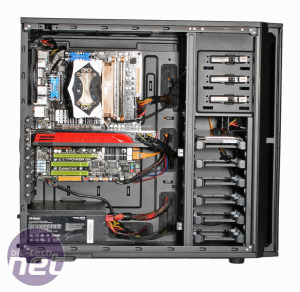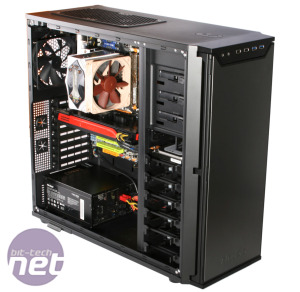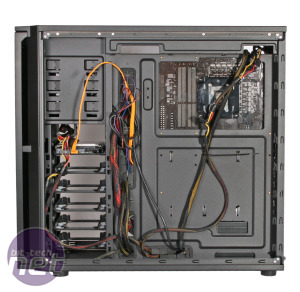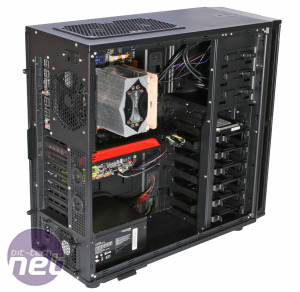
Performance Analysis
Building our test system into the P280 was a stress-free experience; it’s superb cable routing, large central compartment and simple drive bay fittings made everything straight forward, with nary an expletive uttered throughout the build.
With our Core i7-860 CPU and HD 5870 2GB chugging away under prime95 and the Unigine Heaven benchmark, we found cooling with the P280’s fans set to full speed to be surprisingly dour. A CPU delta T of 52°C is decidedly average and the P280’s lack of intake fans is likely to blame. A GPU delta T of 45°C is also towards the bottom of our cooling graphs, again likely influenced by the lack of intake fans or side vents. The trio of cooling fans were audible at their full speed but weren’t intrusive, providing a low, windy rush rather than an ear-bashing whine.
Dropping the fans to their lowest speed setting saw temperatures only climb by 1°C for both the GPU and CPU with a noticeable reduction in noise levels; at the low speed the three cooling fans were very quiet indeed. The reduced cooling performance did see the P280 slip even further down our performance graph though.
Conclusion
We’re in two minds when it comes to the Antec P280. On one hand, it’s a wonderful case to build a system into, with the superb build quality we’ve come to expect from Antec. There are plenty of excellent design decisions on display, from the pair of externally removable dust filters to the return of the 270° door, and you get the feeling from using the P280 that this is a quality bit of kit.However, cooling is an issue. While it’s certainly not going to come close to cooking your hardware, much of the competition offers lower delta Ts. At £110, we’re surprised to see just three cooling fans too; the Antec Nine Hundred Two (902) is £15 cheaper, yet offers a pair of front intake fans and a 200mm roof exhaust. We’ve no doubt that adding a pair of front intake fans would improve matters, but that’s an additional cost, and there’s no immeadiate way to tie these into the rear mounted fan control panel.
The competition has come a long way since the arrival of the original P180 as well. The Fractal Design Define R3 offers more refined looks and superior cooling, if not as many out and out features, and at only £75 is decidedly more wallet friendly too.
All of which leaves the Antec P280 in a tough spot. Physically sound and with lots of nice extras, it’s in no way a case that we’d regret buying. However, it’s not one we’d actively seek out either, with similar, and more affordable, options elsewhere.
-
Value14 / 20
-
Design26 / 30
-
Features17 / 20
-
Cooling23 / 30


MSI MPG Velox 100R Chassis Review
October 14 2021 | 15:04












Want to comment? Please log in.